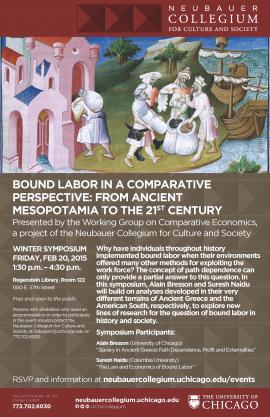Bound Labor in a Comparative Perspective: From Ancient Mesopotamia to the 21st Century
Free and open to the public. All are welcome.
Friday, February 20
1:30 pm - 4:30 pm
Regenstein Library, Room 122
1100 East 57th Street
Chicago, Illinois 60637
Why have individuals throughout history implemented bound labor when their environments offered many other methods for exploiting the work force? The concept of path dependence can only provide a partial answer to this question. In this symposium, Alain Bresson and Suresh Naidu will build on analyses developed in their very different terrains of Ancient Greece and the American South, respectively, to explore new lines of research for the question of bound labor in history and society.
The Working Group on Comparative Economics has explored the “Boundaries of the Firm” in various ways, insisting on the fluidity of the frontier between the firm and the market, the role of the family, or of the state in the definition of economic institutions. The Working Group's 2014 lectures and symposium offered the opportunity to broaden this perspective and to analyze institutions and organizations in an even more global way. The 2014-2015 series focuses on "Bound Labor."
Winter Symposium Speakers:
Alain Bresson (Classics Department, University of Chicago)
Slavery in Ancient Greece: Path Dependence, Profit and Externalities
Thanks to an exceptionally large body of written evidence, the case of slavery in ancient Greece offers the possibility to analyze the complex relationship between social values and profitability in a broad comparative perspective. The history of ancient Greek slavery is the product of a specific cultural and economic evolution. Based on this observation, does it make sense to raise the issue of profitability of ancient slavery, as it has been done for the American South? It certainly does, provided the “externalities” of slavery are not ignored. Besides, again in a comparative perspective, an analysis of the ethical debate about slavery that raged in ancient Greece should include the impact of conceptions of slavery both on on ancient economic accounting logic and on ancient economic thought in general.
Suresh Naidu (School of International and Public Affairs, Department of Economics, Columbia University)
The Law and Economics of Bound Labor
My talk will discuss interactions between historical and contemporary institutions of bonded labor and modern law and economics, organized around the economics of imperfect competition and incomplete contracts. I'll discuss some results on the property law of slaves, drawing on recent results on fugitive slaves and slaves-as-collateral in credit markets. I'll also talk about Master and Servant law allowed extensive contract enforcement in 19th century England and in the Jim Crow South, with ambiguous effects on welfare. I'll argue that the eradication of forced labor was not a direct consequence of industrialization, and it took political transformations (such as franchise extension in England) or massive outside shocks (the 1927 Mississippi flood) to secure the abolition of bonded labor in the Atlantic economies. I'll conclude by discussing contemporary migrant labor in the Gulf countries and recent rise of non-compete agreements in the U.S.. The institution of free labor, in this view, is both a restriction on markets as well as an enabler.


